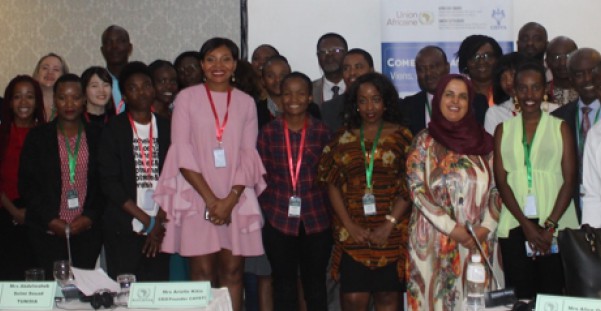[Africa News]
The African Union International Centre for Girls’ and Women’s Education in Africa 2019 theme was “Expanding out-of-school girls’ opportunities through digital transformation.”
Photo: African Union
Attendees at the recent Second Innovation Education Expo urged African nations to utilize digital education to empower African women.
Experts in digital transformation, gender and education, attending the Second Innovation Education Expo, urged the continent to adopt inclusive digital policies for out-of-school girls in Africa during a side event convened by the African Union International Centre for Girls’ and Women’s Education in Africa (AU/CIEFFA) in Gaborone, Botswana on 21st August 2019.
Under the theme: “Expanding out-of-school girls’ opportunities through digital transformation”, panel members underlined that ICTs are a powerful tool for the 53 million out-of-school girls and young women in Africa to address their daily challenges and dreams. The digital revolution offers an opportunity to empower girls and young women by developing their creativity and enhancing their entrepreneurial skills though a problem solving approach, placing the latter at the heart of innovators’ community. ICTs also transform the learning experiences of marginalised people and give them the opportunity to benefit from learning resources both online and offline. They further agreed that harnessing ICTs in education will go a long way in contributing to achieving Goal 17 of Agenda 2063’s aspiration 6 which seeks to eliminate all barriers to quality education, health and social services for women and girls.
However, harnessing the digital revolution implies a holistic transformation of not only the education system (formal and non-formal), but also of the whole society. As a matter of fact, there is a need for the education system to take into account the specificity of girls’ and young women’s needs through gender responsive policies promoting gender mainstreaming in education and ICT policies, to break stereotypes hindering girls’ participation in STEM fields.
Furthermore, putting in place a gender responsive teacher education is also key as teachers are one of the building blocks in mainstreaming ICT in education. Education systems should guarantee that the learner is fully empowered to drive the digital revolution of education systems and has a full understanding of gender specificities within the education ecosystem. There is a need for him/her to be empowered with the necessary skills, both in ICT and gender so as to play his/her role as an agent of change in education. This is in line strategic objective 3 of the Continental Education Strategy for Africa (CESA 16-25) which recommend to strengthen capacities of education managers and administrators on the use of ICTs.
A strategic collaboration between the private sector, the civil society and the government was proposed by the panelists to scale up the different initiatives that are currently implemented to attract more out-of-school girls in ICTs or STEM. It is observed that there are many on-going initiatives, but most of them in silos. Participants underscored the need for partners to come together for impact in the process of reintegrating out-of-school girls.
The panel discussion was also the opportunity to showcase the projects of some young women leading innovations through ICTs in their countries/communities.
The African Union International Centre for Girls and Women’s Education in Africa is a specialised institution of the African Union under the Department of Human Resources, Science and Technology. The Centre aims to promote girls’ and women’s education with a view towards their full participation in the eradication of poverty and the edification of a peaceful world for sustainable human development. Its mandate is in line with the vision of Agenda 2063, especially its aspiration 6, which calls for full gender equality in all spheres of life, as well as the strategic objective 5 of the Continental Education Strategy for Africa (16-25) on accelerating processes leading to gender parity and equity in Africa.






